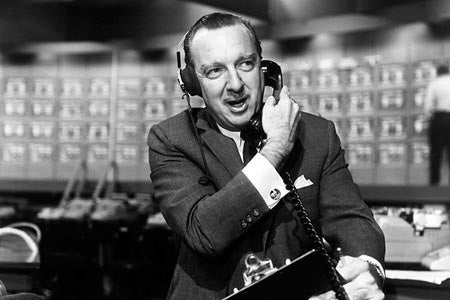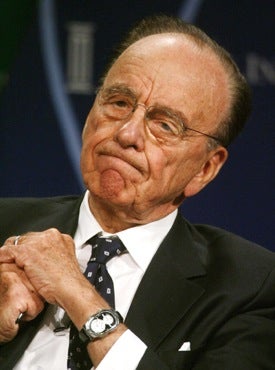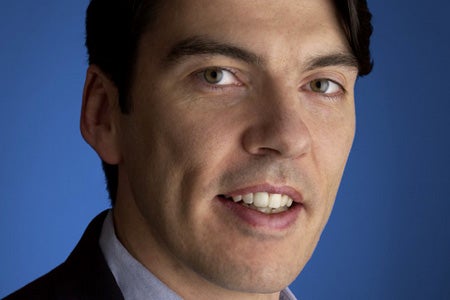1. Obama makes history. The historic inauguration of Barack Obama as the 44th — and first black — president of the United States on Jan. 20 was the first must-watch-if-not-be-there media event of the year. Millions turned up, and tuned in.
 Given Obama’s difficult first year – one that included a stunning Nobel Peace Prize win (“Obama Award Stuns Twitter, Blogosphere, Dude Who Toasts My Bagel”), a state dinner security breakdown ("White House Party Crashers: We Were Invited") and bizarre, protracted, widely-criticized standoff with Fox News ("White House War With Fox News Fuels Ratings Fire") — it’s almost hard to remember how much gravity the event carried with it across all media, including Fox.
Given Obama’s difficult first year – one that included a stunning Nobel Peace Prize win (“Obama Award Stuns Twitter, Blogosphere, Dude Who Toasts My Bagel”), a state dinner security breakdown ("White House Party Crashers: We Were Invited") and bizarre, protracted, widely-criticized standoff with Fox News ("White House War With Fox News Fuels Ratings Fire") — it’s almost hard to remember how much gravity the event carried with it across all media, including Fox.
Almost.
2. Michael Jackson, Farrah Fawcett die on the same day. Even by Hollywood standards, June 25 was a crazy day. Farrah Fawcett, the “Charlie Angels” actress, died at 62 after a long battle with cancer. But the coverage of Fawcett’s expected death paled in comparison to what came next: Michael Jackson, the King of Pop, was found unconscious in his Los Angeles home. Two hours later he was pronounced dead at 51. Thus began hours of wall-to-wall coverage, followed by months of media scrutiny – of Jackson, of his doctors, of his family, of the media itself.
It seemed like every media outlet — especially in death — wanted in on a piece of Jackson’s action. According to one study, magazine publishers have cashed in to the tune of $55 million on the fall of the King of Pop.
The $55 million is actually pretty small, when you consider that virtually every single magazine publisher – from Entertainment Weekly to People to Time to even Architectural Digest — rushed to their own Jacko tribute to print in the hopes of capitalizing on collectors. The magazine world’s version of ambulance chasing.
 3. Walter Cronkite dies, but where’s CBS? The legendary newsman and iconic CBS anchor died on Friday July 17. CNN, MSNBC and Fox News devoted most of their Friday evening coverage to Walter Cronkite.
3. Walter Cronkite dies, but where’s CBS? The legendary newsman and iconic CBS anchor died on Friday July 17. CNN, MSNBC and Fox News devoted most of their Friday evening coverage to Walter Cronkite.
CBS did not. The network, on which Cronkite became the "most trusted man in America" during his 20-year tenure as evening news anchor, announced his death at 8:13 p.m. ET during a special report by Katie Couric: "It is my sad duty to tell you that our friend and colleague Walter Cronkite has died." Yet CBS — which called Cronkite “biggest name in television news, the king of the anchormen; in fact, he was the reporter for whom the term ‘anchorman’ was coined” — followed Couric’s 8-minute report with … its regular Friday programming: reruns of "Ghost Whisperer" (starring the likeable Jennifer Love Hewitt), "Flashpoint" and the eyestrain-inducing "NUMB3RS."
Instead, CBS colleagues were forced to go on CNN to remember their friend and colleague.
4. Letterman shocks audience with sex tale. For a few days in November, it was simply known as The Show.
David Letterman’s shocking on-air admission that he had sex with female staffers and that he was the target of a $2 million extortion plot hatched by a CBS News producer – dark as it is – was revealed in a light-hearted, self-deprecating tale from his desk.
“The creepy stuff was that I have had sex with women who work for me on this show," Letterman said. "Now, my response to that is, ‘Yes I have.’"
"And would it be embarrassing if it were made public? Perhaps it would, perhaps it would – especially for the women.”
The audience, some of which thought it was the setup for a bit, laughed nervously.
“I don’t plan to say much more on this particular topic,” Letterman said.
Except he did, opening the show after the show with a joke that referenced the ensuing media firestorm.
"Did, uh, did your weekend just fly by?" This time, the audience roared with laughter.
"I’ll be honest with you folks, I’d give anything to be hiking on the Appalachian Trail. I got in the car this morning and the navigation lady wasn’t speaking to me."
The only thing missing was an apology – and that came after the monologue. First, Letterman apologized to his staff, and later, his wife: “She has been horribly hurt by my behavior, and when something happens like that, if you hurt a person and it’s your responsibility, you try to fix it,” Letterman said. “And at that point, there’s only two things that can happen: either you’re going to make some progress and get it fixed, or you’re going to fall short and perhaps not get it fixed, so let me tell you folks, I got my work cut out for me.”
5. Rupe Rages paid content debate. During a conference call with investors in early August, News Corp. chairman Rupert Murdoch said he planned to use the Wall Street Journal’s pay model across the company’s news-driven web properties – and not just those of his newspapers. “Quality journalism is not cheap,” Murdoch said while discussing his media empire’s $3.4 billion fiscal year net loss. “The digital revolution has opened many new and inexpensive delivery methods,” he said. “But it has not made content free.” Murdoch added: “Accordingly, we plan to charge for all our news sites.” That would include the NYPost.com, Times of London and others.
Later, when talking about the rise of mobile devices, Murdoch said: “We intend to be platform-neutral, but never free.” In November, he even managed to draw Google into the fire.
Many in media share Murdoch’s sentiment, of course, but because Rupe makes headlines whenever he opens his mouth, a line in the sand of the paid content debate ("What It Will Take for Paid Content to Work") was drawn.
With major companies spending most of 2009 planning their approaches to paid content, 2010 is shaping up to be the year we find out if Rupe was right, or wrong.
6. Busted Balloon Boy boots. It was the flight heard round the world, a made-for-live television event that – like O.J. Simpson’s slow-speed chase 15 years before – captivated an entire nation. And only when it ended did it get really weird. Appearing on CNN’s "Larry King Live,” hours after he was found “hiding,” Falcon “Balloon Boy” Henne was asked by Wolf Blitzer why he didn’t respond when he heard his parents calling for him. His response? After looking at him mom, he said: "We did this for the show." (Blitzer, amazingly, did not immediately follow up.)
Those six words sent Twitter into a frenzy, and by the next morning, the Henne family was feeling the heat – so much so that Balloon Boy vomited – twice – while doing the morning talk show circuit.
The air began to pour out of the Hennes’ story, which eventually led to misdemeanor charges and a 90-day jail sentence for Richard Henne. Which was too soft, in my opinion. They should’ve sent the entire family up in a balloon.
 7. AOL gets spun. AOL chief executive Tim Armstrong announced a plan to cut 2,500 jobs — more than a third of its staff — in a drastic expense-trimming move that was meant to satisfy investors as it prepared for survival outside the Time Warner bubble. The announcement came just days after Time Warner said it would finally spin off AOL, ending one of the most troubled corporate marriages in media history.
7. AOL gets spun. AOL chief executive Tim Armstrong announced a plan to cut 2,500 jobs — more than a third of its staff — in a drastic expense-trimming move that was meant to satisfy investors as it prepared for survival outside the Time Warner bubble. The announcement came just days after Time Warner said it would finally spin off AOL, ending one of the most troubled corporate marriages in media history.
AOL, which employs about 6,900 people, had already earmarked $200 million to execute the mass layoffs, according to a filing with the Securities and Exchange Commission. At one point this decade, AOL employed 20,000.
They even unleashed a series of new logos to mark the occasion.
When AOL did finally spin off, on Dec. 9, investors were nonplussed, and the stock price has more or less hovered between $23 and $24 per share ever since.
8. Comcast buys NBC Universal. After months of hemming and hawing, Comcast, the cable, confirmed what TheWrap had been reporting all along: that it had agreed to acquire a controlling stake in NBC Universal from General Electric, in a deal worth more than $13 billion.
It was by far the biggest media deal of the year — and perhaps the decade — the effects of which will be fully known until the sale goes through. (The merger faces stiff antitrust scrutiny from the Feds, and the companies said it did not expect approval for a year or more.) With NBCU, Comcast looks to create a new kind of Hollywood giant, combining the nation’s largest cable distribution network with a preeminent entertainment company.
No one really knows what it’ll look like — not even the executives who engineered the deal — but watching it rattle the foundation of the media industry as we know it should be fun. Pull up a chair and get your popcorn ready for 2010!
 9. Tiger implodes. No story in 2009 – not Balloon Boy, not Letterman, not Jackson — has been talked about, followed, critiqued, analyzed as exhaustively as the saga of Tiger Woods’ “transgressions.” The personal became impersonal.
9. Tiger implodes. No story in 2009 – not Balloon Boy, not Letterman, not Jackson — has been talked about, followed, critiqued, analyzed as exhaustively as the saga of Tiger Woods’ “transgressions.” The personal became impersonal.
Woods’ bizarre one-car crash at his Orlando, Florida home unwittingly opened the Pandora’s box of sexual scandal. Tiger’s “transgressions” were trotted out – by magazines, newspapers, the “Today” show – one by one. Statements were posted. Sponsors fled. The New York Post put Tiger on its cover for a record 20 days straight – one more than 9/11. Shareholders in the companies that had been endorsing Eldrick “Tiger” Woods lost billions.
Perhaps the most salacious part of the Tiger Woods story was that it could’ve been avoided three years earlier: according to a pair of reports, the Woods camp cut a deal with the National Enquirer not to publish photos of one of Woods’ “transgressions” in exchange for a rare interview that ran in Men’s Health, a magazine that, like the Enquirer, is owned by American Media Inc.
It was the kind of backroom deal that makes the public skeptical about the media industry — and one that sorta sums up media in 2009.






